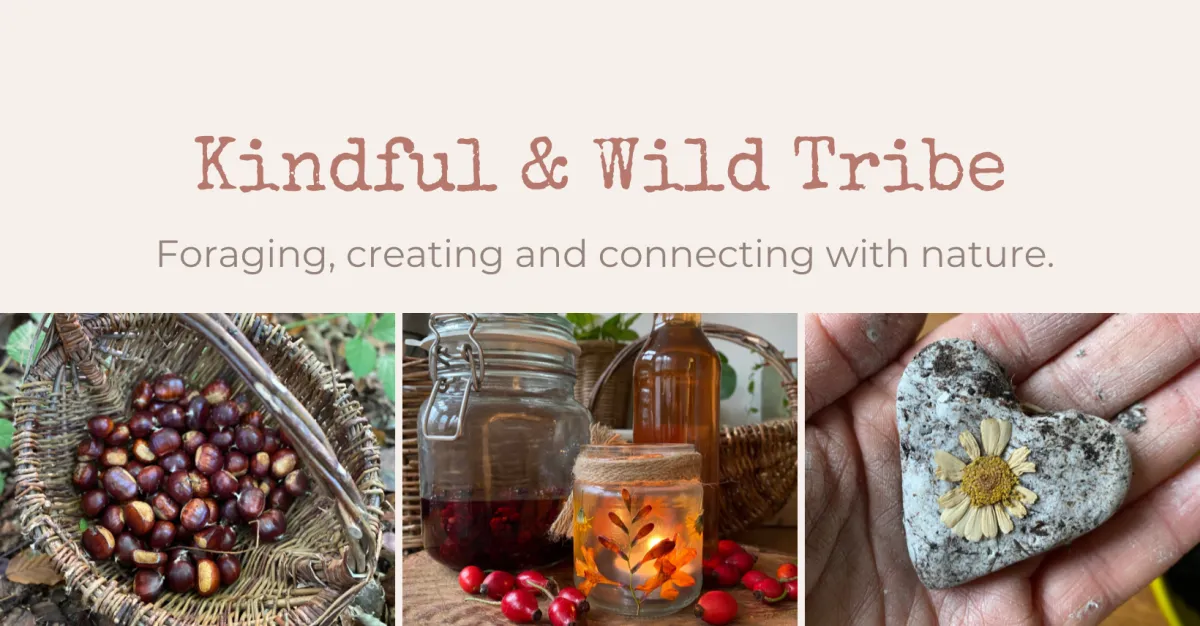BLOG
Wild Blog
Explore nature-inspired blogs on foraging, wild crafting, and mindful connections with the natural world.

Dandelions Aren’t Weeds—They’re Medicine, Food, and Pollinator Gold
Dandelion: The Underrated Powerhouse Growing at Your Feet
Most people see dandelions as nothing more than stubborn weeds, popping up in gardens, driveways, and fields. But what if I told you this common plant is actually a powerhouse of nutrition, medicine, and environmental benefits? The more I learn about dandelions, the more amazed I am at just how valuable they are—not just for us but for the entire ecosystem.

A Name That Speaks of Healing
Dandelion’s official name, Taraxacum officinale, hints at its long history of use as a healing herb. The name Taraxacum is thought to come from the Greek words taraxos (disorder) and akos (remedy), suggesting its role in treating ailments. Some sources trace it back to the Persian word tarkhaskun, meaning “bitter herb.” The Latin officinale was historically given to plants recognized for their medicinal properties—dandelion was once considered an official remedy.

Nature’s Soil Builder and Pollinator Friend
Dandelions do more than just grow anywhere—they actually improve the soil. Their deep taproots pull up nutrients from deep underground, enriching the surface and making those minerals available to other plants. This makes them a natural soil conditioner, helping surrounding plants thrive.
And then there’s their role in supporting wildlife. Their bright yellow flowers provide an early source of nectar for pollinators like bees and butterflies when few other flowers are blooming. Knowing how beneficial dandelions are, it’s heartbreaking to think they’re so often sprayed with chemicals that harm both our health and the environment. We’re destroying something incredibly valuable with something incredibly toxic.
More Than Just a Pretty (or Pesky) Flower
Dandelion leaves grow in a rosette shape, spreading out from the base of the plant. Their jagged, tooth-like edges are where they get their name—dent de lion in French means “lion’s tooth.” The vibrant yellow flowers, which bloom from spring through autumn, are actually made up of tiny individual florets, a trait they share with other plants in the daisy family (Asteraceae). Each smooth, hollow stem holds a single flower and contains a milky sap known as latex.
Packed with Nutrients and Health Benefits
Dandelions are one of the most nutrient-dense plants you can find growing wild. They contain high levels of potassium, calcium, zinc, iron, magnesium, and vitamins A, C, and K. Their leaves, roots, and flowers all have different uses, and historically, folk medicine has valued them for their effects on digestion, liver health, and fluid balance.
I love a roasted dandelion root coffee!

One of the most well-known uses of dandelion is as a natural diuretic, helping the body release excess water. Unlike pharmaceutical diuretics, which can deplete potassium levels, dandelion provides its own potassium, making it a gentler option. It has also been used traditionally to support liver function, aid digestion, and even help regulate blood sugar levels.
How to Use Dandelion in Everyday Life
Dandelions are one of the easiest plants to forage, and every part of the plant is useful:
Roots – Roast them for a rich, caffeine-free tea that supports digestion and liver health.
Leaves – Toss young leaves into salads or blend them into pesto for a nutrient boost.
Flowers – Make dandelion syrup, add them to baked goods, or fry them into fritters for a tasty treat.

Dandelion for Skincare: A Soothing, Healing Remedy
Beyond its benefits for internal health, dandelion is also wonderful for skincare. I infused dandelion flowers into oil for several weeks and used it to create a body lotion bar. This infusion extracts the plant’s healing compounds, making it deeply nourishing for the skin. Here’s what makes dandelion-infused oil so special:
🌿 Anti-inflammatory – Dandelion flowers contain antioxidants and compounds that help soothe irritated skin, making the oil great for calming rashes, dryness, and mild skin conditions like eczema.
🌼 Moisturizing & Nourishing – The infused oil is rich in vitamins A, C, and E, which deeply hydrate and support skin repair. It helps with dry, chapped skin and promotes a healthy glow.
✨ Pain-Relieving & Muscle-Soothing – Traditionally, dandelion oil has been used to relieve sore muscles and minor aches. The anti-inflammatory properties may help ease tension in tired or overworked muscles.
💛 Gentle for Sensitive Skin – Unlike harsh synthetic ingredients, dandelion-infused oil is gentle and can be beneficial for sensitive skin, reducing redness and irritation.
Making your own dandelion-infused oil is simple: just collect fresh dandelion flowers, let them dry for a day to remove excess moisture, and then cover them with a carrier oil (like olive, jojoba, or almond oil). Let the mixture sit in a warm, sunny spot for a few weeks before straining. The result is a golden, skin-loving oil that can be used in homemade lotions, balms, or massage oils.
A Shift in Perspective
Dandelions are not just weeds. They are healers, soil regenerators, and food sources—both for us and for pollinators. Instead of reaching for chemical sprays, what if we started seeing them for what they truly are? What if we protected them, appreciated them, and used them to nourish both ourselves and the land?
The next time you see a dandelion, take a closer look. This little plant has so much to offer—it’s just waiting for us to notice.

Join the
Kindful and Wild Tribe
Facebook group
If you’re passionate about connecting with nature, foraging, wild crafting, and sharing your adventures, this space is for you!
Join the group to share inspiring photos, creative ideas, seasonal finds, and helpful tips.
I’ll be sharing recipes, nature-inspired activities, and suggestions to help you reconnect with the wild around you. I'd love to see you there.
© Copyright 2025 Kind & Wild- Privacy Policy - Terms & Conditions

